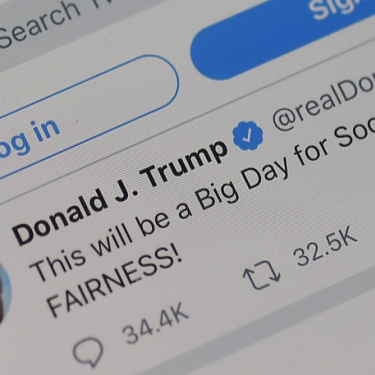Trump/Twitter: Could everyone calm down and look at the big picture?

The heated debate triggered by Twitter’s decision to put fact-check warnings on Donald Trump’s tweets and the US president’s retaliation in the form of an “Executive Order on Preventing Online Censorship” needs to be refocused on the structural causes of the online information chaos, Reporters Without Borders (RSF) says.
On 26 May, Twitter began fact-checking Trump’s tweets for the first time and appended “Get the facts” links to two of his tweets claiming that use of mail-in ballots in the 2020 presidential election would lead to massive fraud. Forty-eight hours later, the enraged president signed an executive order calling for change to the US legislation that regulates online platforms, in particular Section 230 of the 1996 Communications Decency Act, which shields online services from liability for user-posted content.
“The tech giants don’t have the legitimacy to take editorial decisions – going down that road entails considerable risk,” RSF secretary-general Christophe Deloire said. “Entities that have hundreds of millions or even billions of subscribers cannot act like news media without danger in the long term. In view of their power over the mass processing of news, information, opinions and ideas, platforms and social media must be subjected to an adequate system of accountability, and revising Section 230 is not absurd as long as it benefits freedom of opinion and pluralism. We therefore urge everyone to calm down and to approach these major issues with the required serenity and intelligence. Both politicians and platform executives must look at the big picture and must address the structural causes of the online information chaos on the basis of democratic principles.”
The existing systems of accountability (or lack of accountability) for online platforms and social media are no longer adequate and must be revised. This involves amending the e-commerce directive by means of the Digital Services Act in Europe, and amending Section 230 in the United States. The platforms that shape and “structure” the online domain must in future be required to respect democratic principles such as those proclaimed in the Declaration on Information and Democracy that an international Commission of 25 prominent figures issued in November 2018.
This initiative led to the creation of an International Partnership for Information and Democracy at the most recent UN General Assembly that has so far been signed by 36 countries. These 36 countries, which do not include the United States, have urged online platforms to be transparent and to respect a number of principles, including the need to promote reliable news and information.
Together with 11 other civil society organizations, RSF has meanwhile created the Forum on Information and Democracy, an entity that aims to bring experts together to address the issues resulting from the paradigm change in the public domain, and to formulate recommendations for regulation and self-regulation.
RSF has also created the Journalism Trust Initiative, a set of standards designed to encourage respect for journalistic methods and ethics by means of indicators measuring the reliability and independence of information. Platforms could use the JTI to promote trustworthy news and information by incorporating these indicators into their algorithms.



